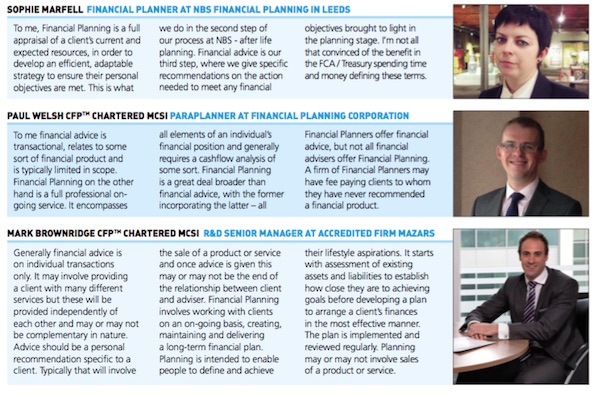
- Home
- News
Defining Financial Planning and advice post-FAMR

Plans for a “single clear definition of financial advice” were outlined in the Budget and the Financial Advice Market Review and it’s clear that steps will now be taken to achieve this aim, potentially a pivotal moment for the financial advice sector.
The FAMR panel said this would help make financial advice and guidance more affordable for consumers. The FAMR report stated: “HM Treasury should consult on amending the definition of regulated advice in the existing Regulated Activities Order so that regulated advice is based upon a personal recommendation, in line with the EU definition set out in the Markets in Financial instruments Directive (MiFID) 44.”
Sophie Marfell, Financial Planner at NBS Financial Planning, was sceptical. She said: “Product recommendation is regulated and a firm is required to provide details of the service they provide; that should be sufficient. Beyond that, people will make up their own minds about who they want to deal with and why, regardless of the title it’s given.
“I believe time would be better spent simply extolling the benefits of working with a financial professional. If more is done to highlight great outcomes, clients will be more inclined to look for that level of service and move on if they are not receiving it.”
Gemma Davies CFPTM Chartered MCSI, of Uniq Family Wealth, was more positive. She said: “Consumers are still none the wiser as to the key benefits of working with each professional (adviser or planner) and I think that by spelling these points out clearly, this will help them make a clear distinction as to what they need and who can help them the most (as defined by what they are looking to achieve).
“There is currently a sliding scale between those who operate to a traditional notion of financial advice, those who adhere to the principles of Financial Planning and those in the middle of the two. By having clear definitions set at regulatory level, this will also help those in the financial community communicate clearly who they are and how they can help.”
Mark Brownridge CFPTM Chartered MCSI, of Accredited firm Mazars, said the FAMR was key to creating clarity. He said: “It’s ridiculous the industry has for so long had no clear definition for the very work it undertakes. The difficulty will be coming to a commonly agreed, jargon free, simple concise definition that consumers find easy to understand. Consumers need to be involved in the definition process because if it’s left to those in industry, it will undoubtedly be self serving and complex.”
Paul Welsh CFPTM Chartered MCSI, of Financial Planning Corporation, said: “To ensure they get this right first time, I think the FCA and Treasury should take the time to ensure they fully understand the difference between the terms (planning and advice). To develop these definitions, I’d like the FCA to spend time talking to firms who offer a holistic and professional Financial Planning service. I also think the differences need to be clearly communicated to the general public – firms themselves will have a part to play in that of course.
Dan Woodruff CFPTM, owner of Woodruff Financial Planning, said: “The public has no way of differentiating between the two. It is common to see other advisers who say they offer Financial Planning but then just talk about products. That’s not planning, it’s advice. I’d like the Treasury and FCA to get a better understanding of the difference since Financial Planning is definitely the direction of travel in the profession. Advisers who don’t offer planning shouldn’t be able to call themselves Financial Planners.”
Dennis Hall Chartered MCSI, MD of Yellowtail Financial Planning, said: “Frankly the FCA hasn’t got a cat in hell’s chance of establishing a set of definitions that would satisfy either the public, or the professionals who use these terms. I’d rather they visited the definitions around independent and restricted which would have far more relevance to advisers and the public at this stage.”
The challenges that come with finding a single way to define financial planning
People say if you ask five economists to forecast what a single index will be in a month, you’ll receive five different opinions, writes Simon Culhane Chartered FCSI, chief executive CISI.
The same can be said for planners. If you take a meeting in Toronto I attended recently with 25 CEOs who operate CFPTM examinations in their territory and ask them to define what is Financial Planning, you’d receive 25 opinions.
One person’s financial advice is another’s Financial Planning and it’s clear there is such a big overlap and therefore it’s not possible to generalise. There is a consensus that Financial Planning is holistic and goal centred and while some advisers would also fit that description – many wouldn’t. Most, however, would agree that Financial Planning and financial advice are interwoven to the point the terms can sometimes be interchanged. If we assume for example, that financial advice is product related, and Financial Planning is lifestyle and goal centred then we can agree that Financial Planning will contain an element of financial advice.
Likewise, advice without an element of planning is just product sales, so most advisers will be providing at least an element of planning. Regulators across the world do not distinguish between Financial Planners and advisers. Nor do customers. This ignorance is why, in the US and Australia (where most of the 160,000 global Financial Planner professionals are based), the CFPTM examination, consciously and deliberately, interchanges the words planner and adviser. The last US marketing campaign said “make sure that your financial adviser is a CERTIFIED FINANCIAL PLANNERTM professional”.
The conclusion of the Toronto meeting was clear. To grow Financial Planning as a profession, we need to look outwards, widen our appeal and make our qualifications and membership services attractive to advisers, many of whom don’t know, yet, what it means to be a planner. We need to ensure that planners and advisers look after their clients to their benefit - using the trusted six step Financial Planning process and CFPTM designation.
Whether they call themselves Financial Planners or advisers is secondary, its action that counts.


